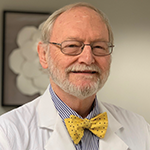“Although there is a lot of science underpinning the specialty, what is really interesting to me is the great amount of art that is still required,” says Dr. Gutierrez. “It is more right-brain oriented and requires intuition.”

This can be a two-edged sword. The thought part may scare off some students, if not handled correctly.
“One of the things that is important is to try to simplify rheumatology,” says Dr. Brasington. “I’ll often say this is just a matter of X then Y then Z, making it approachable and accessible to someone. That is important to young people.”
Another aspect of the specialty that students may find compelling is the old-school nature of the rheumatologist’s practice.
“One of the things I emphasize is that we practice, in many ways, a more old-fashioned style of medicine,” says Dr. Brasington. “We get a good history and physical, perform some basic tests and then it is largely sitting down and putting the pieces together. We are much less dependent on technology and more dependent on thinking.”
Social Aspects
There are also social aspects of the specialty that aren’t seen in some other kinds of medicine. Many students may gravitate toward a form of practice in which they actually get to know their patients.
“This can be a very rewarding profession, personally,” says Dr. Daikh. “In addition to delving deeply into a group of diseases, you are able to build a close therapeutic relationship with patients over many years.”
Sitting down with a patient and discussing not only their disease process but also how the family is doing can be a major factor in the career decisions of many students. This is something that physicians involved with teaching medical students in medical schools and the community should try to emphasize.
“For patients with rheumatoid arthritis and other rheumatic diseases, we can make a huge impact on their lives going forward,” says Dr. Gutierrez. “With the drugs we now have, people don’t have to suffer as much, and many can lead very close to normal lives. That can be very satisfying, both personally and professionally.”
Another of the social aspects is that the size of rheumatology makes it more collegial than some other specialties.
“We are a smaller group than many specialties,” says Dr. Daikh. “We have a single professional society composed of both academic and community physicians. We work together all the time. We have similar goals, especially as they relate to education, clinical care and fostering the scientific growth of the field.”
Lifestyle
A final consideration for the student planning their career is the lifestyle the specialty provides them.
